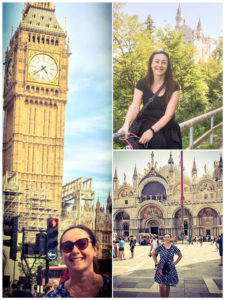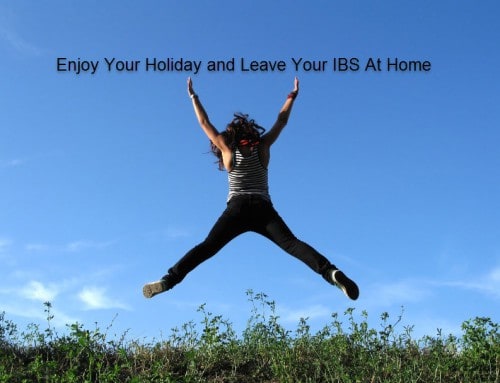Going On Holiday? Be Prepared, Relax and Enjoy!
Vacations and holidays are times everyone looks forward to, even those who are on a low FODMAP diet. But these times can be challenging for us low FODMAP dieters, because traveling brings up the possibility of consuming the ‘wrong’ food and by consequence flaring up our IBS (Irritable Bowel Syndrome).
While travelling, as a rule for myself, I am trying as much I can, not to experiment with new food, especially if it is high FODMAP, I stick to what I know is safe for me.
In this article I have tried to compile a few tips to help all those, who like me, suffer from IBS and want to follow a low FODMAP diet on holiday, and even while they are travelling to their destination.
Safe Food To Eat During The Journey To Your Holiday Destination
If you travel by car, bring enough snacks to keep you going and if your journey is quite long, check out some of the restaurants along the way, they may be able to cater for your food intolerance, especially if you contact them in advance.
Snacks you could prepare in advance:
- Rice salad with canned tuna, chopped boiled eggs, olives, capers, cheese, roasted pickled bell peppers
- Carrot, cucumber, zucchini (courgettes) sticks and other low FODMAP vegetables with a suitable low FODMAP dip – pesto with no garlic, eggplant (aubergine), bell peppers (capsicum) etc.
- Plain (not flavoured) rice crackers with mature cheese (if not dairy intolerant) or peanut butter
- Low FODMAP savoury or sweet muffins
- Low FODMAP nuts and seeds (up to 10 almonds, up to 10 hazelnuts, macadamias, peanuts, pecans, pine nuts, walnuts, pumpkin seeds, sunflower seeds)
- Carry a loaf of suitable low FODMAP bread, you can always stop somewhere and buy something to put in (fried egg, canned tuna, ham, slice of cheese, peanut butter etc.).
If you travel by plane and the food is provided by the airline, unless there is a low FODMAP option (not very likely at the moment, but maybe in the future ;-D ), I believe that the safest option is gluten-free. On my last long haul, I pre-ordered vegan, thinking I’ll get some veggies and tofu or tempeh to eat, instead they gave me vegetarian and most of the food was pasta (normal wheat pasta) and sandwiches (normal wheat bread), so I pretty much fasted for 24 hours. On the way back I changed it to gluten-free and I was able to eat something.
Low FODMAP Food To Eat During Your Holiday
Holiday Home
If you have your own kitchen facilities, you can cook any low FODMAP food you wish. If you are the one in charge of cooking, it is not always necessary to prepare different food for the other member of the family or group, who are not on a restrictive diet. For a few days they can eat what you eat, low FODMAP food can be tasty. Depending on the country you are spending your holiday, you may not find the food and the brands you are accustomed to, therefore you need to substitute. For example if you can’t find low FODMAP pasta and bread, substitute with grains that you can tolerate, like rice and quinoa; potato are also a good base for a lot of dishes. Most meats are ok (some people react to fatty meat), fish is fine, just be careful with the ready-made sauces, make your own from scratch, from raw ingredients and spices.
When stuck, consult the faithful Monash University Low FODMAP App or print a copy of the low FODMAP food from this site. Different countries may have fruits and vegetables that you have never seen or heard before, if in doubt, do not consume food that may cause you problem, especially if you have planned a tour or excursion that is going to take you away from your holiday home and bathroom 😉 for a long period of time.
All Inclusive Holiday
If you are going on an all inclusive holiday, where all your meals are prepared, you will need to pay extra attention as high FODMAP ingredients could be hidden anywhere.
If it’s a buffet style meal, I would stay away from elaborate dishes with mixtures of meat or fish with vegetables cooked in various sauces. I would stick as much as possible to boiled rice, a piece of grilled meat/fish, eggs, mature cheese (if you can tolerate dairy), suitable vegetables (pick out the ones that are not low FODMAP and if there is a mixture of braised/boiled vegetables and you can see chunks of onions, be careful as the Oligos-fructans in the onion could have leached out and into the other vegetable.
In some of the all inclusive clubs, you may be able to talk to the chef and see if he can customise some of his dishes for you. On my last all-inclusive holiday, I asked the chef if I could have some low FODMAP wheat free bread with my meal and not only he made the special bread, but for my birthday he also made a gluten-free, lactose free chocolate cake for me. It was delicious.
If the food is more a-la-carte, there are often grilled meat and fish options, as well as salads and vegetables, which can often be customised, with no dressing or dressing on the side.
No matter where you go, no matter the difference of food taste, culture and language, be always polite, when asking the restaurant staff to help you with your dietary requirement and you may be more successful in obtaining what you want and need.
The low FODMAP diet is not very well-known at present, be patient if they don’t understand what you are talking about, simply explain that some food makes you very sick and you need to avoid it.
The Danger in Sauces and Salad Dressings
So, you are going to a restaurant and the only thing that may be vaguely low FODMAP is a mixed salad. After asking the waiter not to put croutons, onions, beetroot, artichokes etc., you need to tackle the salad dressing problem. One of the biggest dangers found in salad dressing is the presence of high FODMAP ingredients like wheat, garlic, onion, milk products, etc. When possible ask for some simple olive oil (extra virgin is better) and a drop of balsamic vinegar or a squeeze of lemon juice, a pinch of salt and pepper and you can pretty much dress any vegetable.
Holiday At Your Family Or Friends House
Many times the reason people go on holiday is to visit family and friends. This is a relatively simple issue if the people you are going to visit are close family and friends and are already aware of your problem and the dietary restrictions you need to follow. All that is required is a simple and polite reminder.
When friends and family do not know about your dietary choices, the best way to approach the problem is to simply explain the situation, that will count for some interesting conversation, especially if you are at the meal table 😉 . Let them know that you are not following a fad diet of some sort, but a medical proven diet that helps people who suffer from IBS.
Considering that some of the suitable food is a lot more expensive than ordinary food (bread, pasta, cereals, biscuits), you may want to offer to buy or pay for any special ingredients that are required.
Bring with you some of your tasty recipes and offer to cook some of the food, following a low FODMAP diet.
Eating at Restaurants
Ordering at a restaurant can place you in a more uncomfortable position when friends or family are unaware of your problem. A rule of thumb when eating out is: play it safe. Become familiar with the safe low FODMAP food list and select the items that you are reasonable sure will not cause you any problems.
Earlier the issue of salad dressings and sauces was mentioned. Feel free to take along a small supply of your favorites, as many restaurants will allow you to do so. It is also a good idea to call ahead and check if they are able to cook suitable food.
The goal to continue following a low FODMAP diet, while you are on holiday, is so you can enjoy your well deserved break, without pain, and constant trips to the toilets…The secret is to plan what you are going to eat, so that you are not caught off guard….
All the best and enjoy your holiday.
xo Larah



Been on a cruise twice since commencing FODMAP and found very few problems. Make sure you let the chef know at first meal and meals can be prepared specially. Lots of people we met have various dietary prpblems and all are catered for.